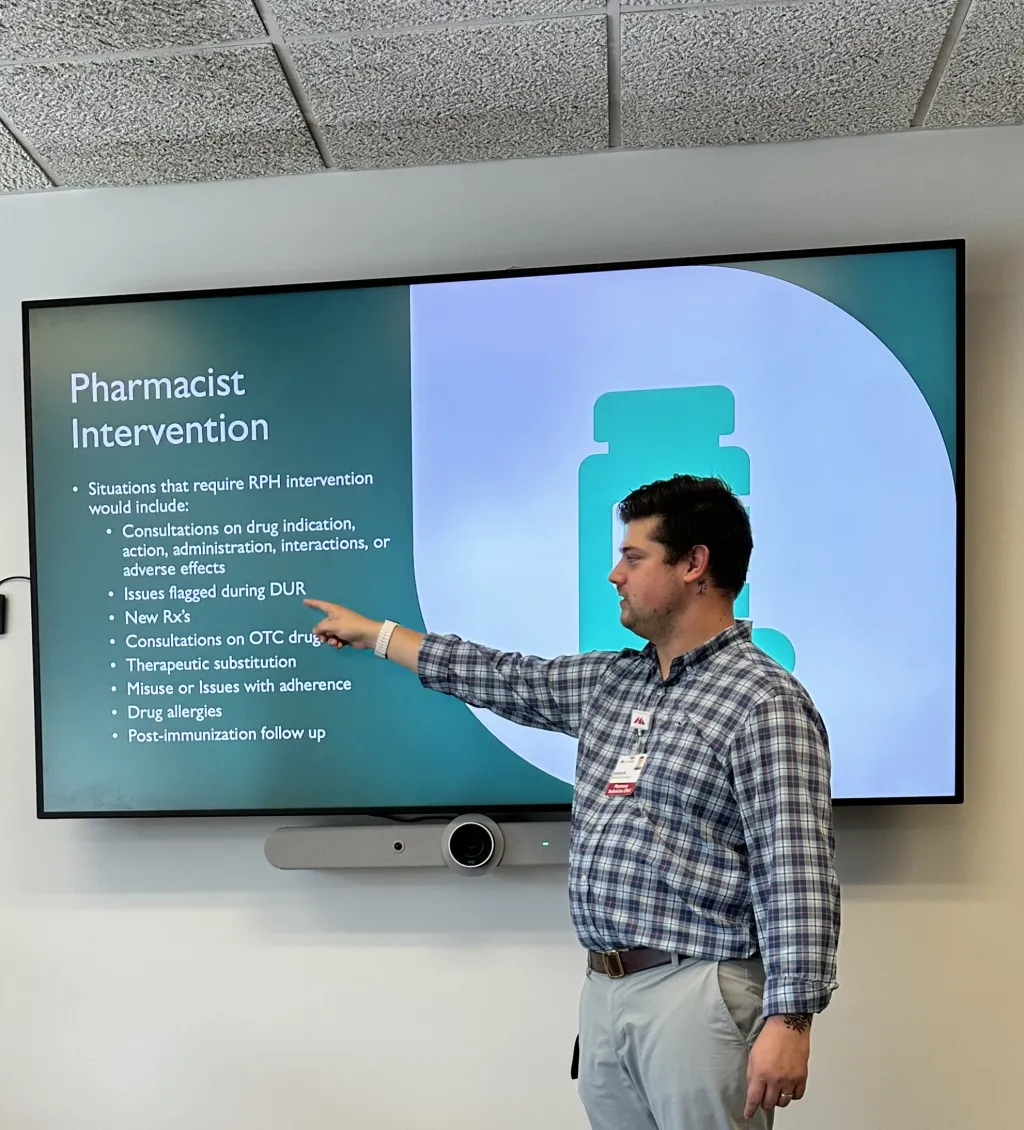Pharm.D. student prescribes knowledge to pharmacy techs at Maine’s largest hospital
In just his first year of pharmacy school, Andrew Marcous is already shaping careers, including his own, and making a lasting impact in his community

Photo courtesy of MaineHealth
Andrew Marcous’s path to pharmacy school hasn’t been a straight line, but his experiences outside the classroom are now shaping his success at the University of New England.
Marcous enrolled in UNE’s School of Pharmacy after graduating from Husson University in 2017, but life had other plans for him at the time. He stepped away then and spent several years working as a pharmacy technician — a job he had held since his undergraduate years — where he gained a newfound passion for building community, as well as the confidence to return to UNE and complete his Doctor of Pharmacy degree program.
Now back as a first-year pharmacy student, Marcous (Pharm.D., ’28) is combining his real-world experience with a love for teaching that he discovered along the way.
“Back in 2017, it just wasn’t the right time for me,” he said of his transition back to the pharmacy counter. “During that time, I found a passion for teaching and the educational side of things. I remembered having really supportive teachers at UNE, and I wanted to follow in their footsteps.”
This fall, Marcous is teaching pharmacy technicians at MaineHealth Maine Medical Center Portland through the hospital’s Pharmacy Technician Certification Program. The course prepares participants for the national certification exam, bringing both professional advancement and financial benefits.
“I’m teaching coworkers the material they need to pass the pharmacy technician certification board exam,” he said. “It’s rewarding to help others build skills and knowledge that make a real impact.”
Marcous knows firsthand how important well-trained technicians are — he’s been one for nearly a decade.
“My first job as a pharmacy tech was my first step into a professional role. It was eye-opening compared to my high school jobs,” he recalled. “Now, 10 years later, it’s surreal to be on the other side, teaching people with no prior pharmacy experience and showing them what they need to succeed.”
Marcous’s students say they appreciate the supportive learning environment he has created.
“It’s a small class, so we can ask questions and have conversations without feeling intimidated,” one student shared, also saying they value the course structure. “The way each section is broken down makes it easier to follow, and the practice quizzes at the end of class really reinforce what we’ve learned.”
Marcous hopes to continue blending pharmacy with education throughout his career.
“Education is the part of pharmacy I enjoy most — passing on what I’ve learned so others can grow,” he said. “My long-term goal is to work in either outpatient care, where I can have a direct impact on the community, or in academia.”
Since returning to UNE, Marcous said he feels more focused and prepared.
“It’s been a completely different experience this time,” he explained. “I’m using the resources available, getting support when I need it, and helping others where I can.”
Marcous’ desire to help others has extended to UNE’s Portland Campus for the Health Sciences, as well. In addition to his hospital teaching, Marcous has stepped in to tutor other first-year pharmacy students, seeking training and being hired by UNE’s Student Academic Success Center to do so.
“It has been impressive to see the difference in Andrew this time around at UNE; he’s a really great example illustrating the value of life experience in nontraditional students,” said Ron Hills, Ph.D., associate professor in the School of Pharmacy, noting that nontraditional students — students typically over age 24 who delay pursuing higher education, are enrolled part-time, work full-time, or attend college after exploring other professional avenues, such as work or military service — constitute over 70% of all college students in the United States.
“Andrew has a refreshingly humble approach and strives to continually improve his own learning, and peer teaching is one of the best ways to achieve self-mastery in an area while also contributing to your professional development,” Hills said.
Living in Saco with his wife, Marcous is excited about the future — whether teaching future technicians or serving as a trusted resource in an outpatient pharmacy, Marcous said he is committed to making a meaningful difference.
“In a close-knit community, everyone knows their pharmacist,” he said. “That’s the kind of connection I want to build — through education and care.”
